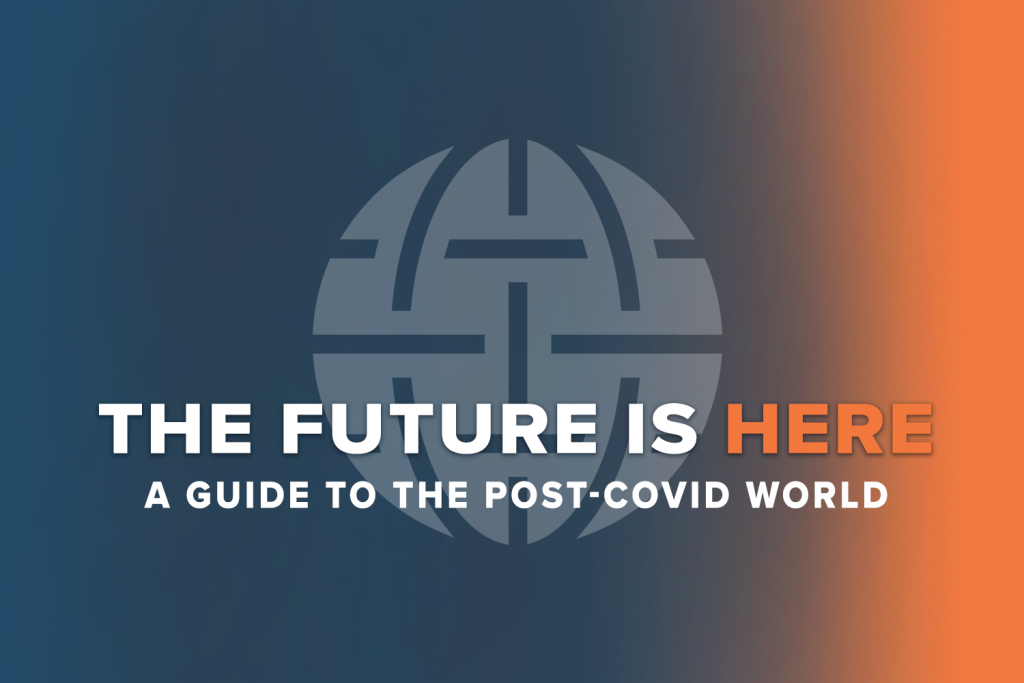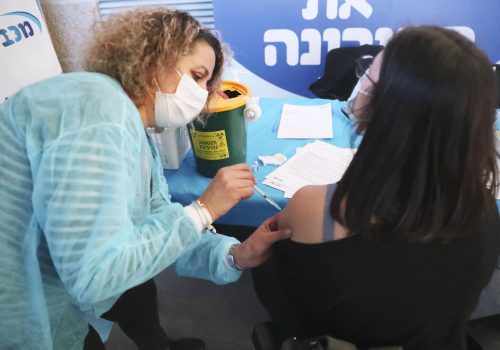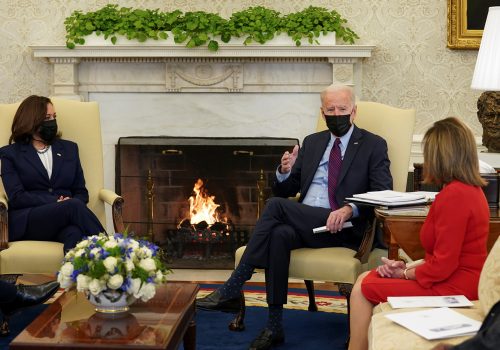The future is here: A guide to the post-COVID world 02/11/2021
Welcome to your guide to where the world is headed during the pandemic era and beyond. Each week, we’ll bring you the latest and most significant expert insights and international news about how coronavirus is reshaping international affairs. To stay updated each week, sign up to the newsletter here.
Let’s take a spin around the globe, in seven minutes or less.
In top stories this week:
- The World Health Organization has backed AstraZeneca’s vaccine, as new variants worldwide add to the challenges faced by governments and health workers.
- The pandemic continues to hamper global movement—from dealing blows to the tourism industry to curbing the migration flows that bolster many economies.
- A symbol of work-life balance is in jeopardy in France, where a ban on eating lunch at your desk has been lifted because of the pandemic.
- But first…
The big story
This week’s key theme: School closures worldwide are having long-term impacts on students
Almost 1.6 billion children were out of school at the peak of COVID-19 lockdowns, according to the World Bank, which publishes a map of global school closures. Students lost two-thirds of an academic year on average due to those closures, UNESCO says.
Pope Francis, in a speech about a year of isolation and “despair,” described a generation of children, alone and in front of their computer screens, enduring the “educational catastrophe” of school closures or distance learning, The Washington Post reports.
The long-term risks of delayed or canceled exams and affected educational milestones include greater social inequity, the Financial Times’ editorial board says. That impact is not uniform, with children in low-income countries among the most severely affected, leading to an increase in deprivation and poverty in these societies, the newspaper adds. And marginalized children worldwide bear the brunt of school closures, from poor nutrition to an increased risk of exposure to exploitation, UNESCO says.
Meanwhile students with better access to technology and teaching have maintained something like an ordinary educational experience thanks to home schooling, the Financial Times’ editorial board adds. But even so, in the United States, signs of inequity are brewing as more affluent parents have ditched public schools in favor of private and in-person education alternatives during the pandemic, while poorer students struggle in online classes, Bloomberg reports.
Parents, juggling work from home—when that’s an option—have been getting into teaching mode as best they can. In the United Kingdom, parents are stressed and anxious about their children’s mental health, as teachers there expect parents to do more home schooling with their primary-age children during the current lockdown than the last one, according to research conducted by the Parent Ping survey app for the Observer newspaper.
Meanwhile, in Hong Kong, parents are “at their wits’ end” and frustrated as school closures continue, Anjani Trivedi writes on Bloomberg, calling closures there unsound and unreasonable given the scale of community transmission.
The reopening of schools looks set to be bumpy, inevitably. Obstacles in the United States, for instance, include the fear of continuing infections in education settings and clashes with labor unions, Bloomberg Businessweek reports.
Still, however heavy the clouds can get, there are some possible silver linings. The pace of innovation in the education sector during the pandemic has been faster than ever before, and that is critical to creating more equitable education systems, Hawah Nabbuye and Sarah Kayondo of the youth-skills organization Educate!—which works in Uganda, Rwanda, and Kenya—write in a Brookings blog.
Add wherever it takes place in the world, the experience of home schooling may foster greater awareness of digital exclusion and other inequities, as well as renewed respect for the role of educators.
Subscribe to The future is here: A guide to the post-COVID world
Sign up for a weekly roundup of top expert insights and international news about how coronavirus is reshaping international affairs.

The world in brief
Insights from across the planet, in ten bullets or fewer
- The WHO recommends the AstraZeneca vaccine despite some concerns over its effectiveness and safety: The WHO has recommended the use of the vaccine developed by AstraZeneca and the University of Oxford even in countries contending with new variants of coronavirus, the BBC reports. The recommendation came after recent doubts about the AstraZeneca vaccine’s effectiveness against new variants, including the variant in South Africa. The public-health body also says the vaccine can be used to inoculate those over the age of sixty-five, which some countries including Germany have advised against, the BBC adds.
- QUOTE: “[T]he existence of a potentially vaccine-resistant variant is a reminder that we’re no longer merely trying to flatten the curve of infections, hospitalizations, and deaths,” Therese Raphael writes on Bloomberg. “If national lockdowns have been akin to war-time measures, as politicians say, the next phases will be more like fighting against a guerrilla insurgency.”
- As the journey into the origins of the pandemic ends, US-China bickering continues. Global sparring over the pandemic carried on after the WHO concluded its field investigations in Wuhan, as China called on the United States to invite the WHO to investigate origins of the COVID-19 outbreak there, Reuters reports. The research team concluded that bats remain the likely source of the virus that causes COVID-19, and that the novel coronavirus did not originate in a laboratory in Wuhan, the newswire adds.
- QUOTE: “With the anticipation of increasing distribution of COVID-19 vaccines, Americans are looking forward to a ‘return to normal.’ We’ve all heard these words, intended to inspire hope. And they do, for some,” lawyer Daniel E. Dawes and epidemiologist Brian C. Castrucci write on the news service Stat. “But the reality is that ‘normal’ is a privilege, one that is out of reach for millions of Americans who had been pushed up against immovable barriers and into systems of oppression long before the arrival of COVID-19.”
- The sharp drop in migration is threatening more than just incomes. The pandemic has officially ended a decade-long growth in skilled migration, denting economic recovery and stunting an increase in countries’ working-age populations, the Financial Times cites data from the Organisation for Economic Co-operation and Development as showing. Meanwhile, authorities in China hoped that stay-at-home restrictions last year would lead to a baby boom, but new data shows that birth rates there continued to drop, The Washington Post reports. “Who was in the mood to make babies [during the pandemic]?” one commentator asked on the microblog Weibo.
- From New Orleans to Spain, a tourism revival is elusive. COVID-19 is tempering the joy, and cutting down sales, associated with the Carnival season in New Orleans, Louisiana, where parades have been scrapped this year, The Associated Press says. In Spain, more than five hundred hotels have already closed due to the pandemic, and many more could suffer the same fate if a second tourism season in a row is effectively canceled by COVID-19, the Financial Times reports. It’s too early to know if summer vacation plans can go ahead or not, UK Health Secretary Matt Hancock says.
- It’s here: The results of Israel’s vaccine campaign are rolling in, and they are promising. Early results of Israel’s speedy Pfizer COVID-19 vaccine rollout are promising because older and vulnerable groups, the first to get the vaccine, are demonstrating a sharp decrease in illnesses, Reuters says. There was a 53 percent drop in new cases and a 39 percent decline in hospital admissions in the first fully vaccinated cohort between mid-January and February 6, the newswire reports, citing Eran Segal, data scientist at the Weizmann Institute of Science in Rehovot, Israel.
- European Union lawmakers approved a mammoth recovery fund. EU legislators approved an $815 billion recovery package of grants and loans intended to help countries recover more quickly from the pandemic, though member states will not get the money for several months, The Associated Press reports. Nations need to submit their spending plans by the end of April, and each plan must allocate at least 37 percent of the money to fighting climate change, among other requirements, the news service adds.
- Restrictions worldwide include a ten-year jail term: Arrivals to the United Kingdom trying to conceal a visit to a high-risk destination now face up to a decade in jail, as part of tough new quarantine restrictions, the Financial Times says. Meanwhile a new lockdown is beginning in Athens, home to half of Greece’s population of eleven million, and has extended restrictions until early March. plans are afoot in Germany to maintain restrictions until mid-March. Tokyo has had success cutting infections thanks to a simple rule of closing bars and restaurants at 8:00 pm, The Wall Street Journal reports.
- A work-life balance policy has been hit by the pandemic. Workday eating habits will undergo a radical shift in France, where the Labor Ministry says it will now allow workers to eat at their desks to help contain the spread of COVID-19 infections, The New York Times reports. The practice was previously banned under the country’s Code du Travail, a labor code of more than three thousand pages. The traditional long and relaxed lunchbreak was already in flux before the pandemic began.
The inside scoop
Insights from the Atlantic Council



